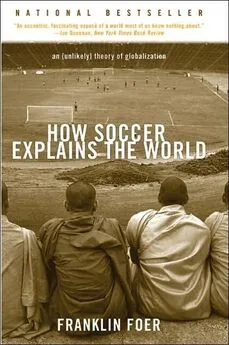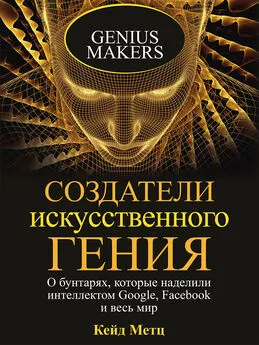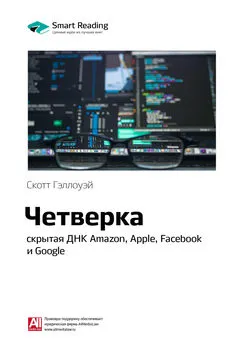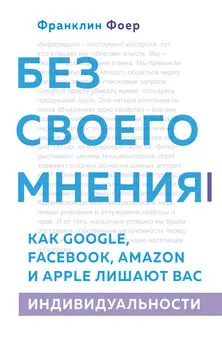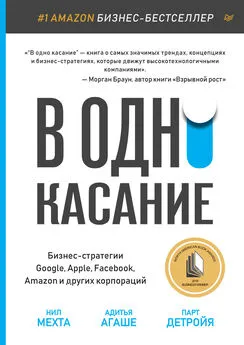Франклин Фоер - Без своего мнения [Как Google, Facebook, Amazon и Apple лишают вас индивидуальности] [litres]
- Название:Без своего мнения [Как Google, Facebook, Amazon и Apple лишают вас индивидуальности] [litres]
- Автор:
- Жанр:
- Издательство:Литагент 5 редакция «БОМБОРА»
- Год:2020
- Город:Москва
- ISBN:978-5-04-108613-8
- Рейтинг:
- Избранное:Добавить в избранное
-
Отзывы:
-
Ваша оценка:
Франклин Фоер - Без своего мнения [Как Google, Facebook, Amazon и Apple лишают вас индивидуальности] [litres] краткое содержание
Без своего мнения [Как Google, Facebook, Amazon и Apple лишают вас индивидуальности] [litres] - читать онлайн бесплатно ознакомительный отрывок
Интервал:
Закладка:
24. Turner, 121.
25. Marshall McLuhan, Understanding Media (McGraw-Hill, 1964), 3.
26. Eric McLuhan and Frank Zingrone, eds., Essential McLuhan (Basic Books, 1995), 92.
27. McLuhan, 80.
28. Isaacson, 261.
29. Tim Berners-Lee, Weaving the Web (HarperCollins, 1999), 209.
30. Linus Torvalds, Just for Fun (HarperCollins, 2001), 227.
31. Tim Wu, The Master Switch (Alfred A. Knopf, 2010), 8.
32. Ron Chernow, The House of Morgan (Atlantic Monthly Press, 1990), 54.
33. Peter Thiel, Zero to One (Crown Business, 2014), 35.
34. Thiel, 32.
35. Alexia Tsotsis, “Marc Andreessen On The Future Of Enterprise,” TechCrunch, January 27, 2013.
36. Ларри Пейдж, выступление перед выпускниками Университета штата Мичиган 2 мая 2009 г. Мои сведения о Карле Пейдже в основном почерпнуты из интервью с его коллегами по университету, например, с Цзу Вэнь Цзином. Семья Пейджа просила его ближайших друзей не давать интервью журналистам, поэтому они беседовали со мной на условиях анонимности.
37. Verne Kopytoff, “Larry Page’s Connections,” San Francisco Chronicle, December 31, 2000.
38. Larry Page interview, Academy of Achievement, October 28, 2000.
39. David A. Vise and Mark Malseed, The Google Story (Delacorte, 2005), 24.
40. Vise and Malseed, 22.
41. Vise and Malseed, 22.
42. Sherry Turkle, The Second Self (Simon & Schuster, 1984), 247.
43. Ken Auletta, Googled (Penguin Press, 2009), 28, 32.
44. Larry Page, Google I/O 2013 Keynote, May 15, 2013.
45. Larry Page, “Envisioning the Future for Google: Always a Search Engine?” (lecture, Stanford University, Stanford, CA, May 1, 2002.)
46. Steven Levy, “All Eyes on Google,” Newsweek, April 11, 2004.
47. Vise and Malseed, 281.
48. Stephen Gaukroger, Descartes (Oxford University Press, 1995), 1.
49. Steven Nadler, The Philosopher, the Priest, and the Painter (Princeton University Press, 2013), 106.
50. David F. Noble, The Religion of Technology (Alfred A.Knopf, 1997), 144.
51. Nadler, 107.
52. Noble, 145.
53. Noble, 147.
54. Isaacson, 41.
55. Stuart Hampshire, “Undecidables,” London Review of Books, February 16, 1984.
56. Andrew Hodges, Alan Turing (Vintage, 2012), 418.
57. B. Jack Copeland, ed., The Essential Turing (Oxford University Press, 2004), 463.
58. Ray Kurzweil, Ask Ray blog, “My Trip to Brussels, Zurich, Warsaw, and Vienna,” December 14, 2010.
59. Ray Kurzweil, “I’ve Got a Secret,” 1965, https://www.youtube.com/watch?v=X4Neivqp2K4.
60. Стив Рабиновиц цит. по: Transcendent Man, directed by Barry Ptolemy, 2011.
61. Transcendent Man.
62. Ray Kurzweil, The Singularity Is Near (Viking Penguin, 2005), 299.
63. Kurzweil, Singularity, 40.
64. Kurzweil, Singularity, 9.
65. Ray Kurzweil, The Age of Spiritual Machines (Viking Penguin, 1999), 129.
66. Kurzweil, Spiritual Machines, 148.
67. Kurzweil, Spiritual Machines, 147.
68. Петер Диамандис, цит. по: Transcendent Man.
69. Kurzweil, Singularity, 389.
70. Robert M. Geraci, “Apocalyptic AI: Religion and the Promise of Artificial Intelligence,” Journal of the American Academy of Religion 76, no. 1 (March 2008): 158–59.
71. Wendy M. Grossman, “Artificial Intelligence Is Still the Future,” The Inquirer, April 7, 2008.
72. Kurzweil, Singularity, задняя сторона обложки.
73. John Markoff, Machines of Loving Grace (HarperCollins, 2015), 85.
74. Alphabet Inc., Research & Development Expenses, 2015, Google Finance.
75. Josh McHugh, “Google vs. Evil,” Wired, January 2003.
76. Greg Kumparak, “Larry Page Wants Earth to Have a Mad Scientist Island,” TechCrunch, May 15, 2003.
77. Robert D. Hof, “Deep Learning,” Technology Review, www.technologyreview.com/s/513696/deep-learning.
78. Sara Jerome, “Schmidt: Google gets ‘right up to the creepy line’,” The Hill, October 1, 2010.
79. David Rowan, “On the Exponential Curve: Inside Singularity University,” Wired, May 2013.
80. “Google Pledges $3 Million to Singularity University to Make Graduate Studies Program Free of Charge,” Singularity Hub, January 28, 2015.
81. Exponential Advisory Board brochure, Singularity University.
82. “Time Talks to CEO Larry Page About Its New Venture to Extend Human Life,” Time, September 18, 2013.
83. Steven Levy, In the Plex (Simon & Schuster, 2011), 354.
84. Levy, In the Plex, 355.
85. Levy, In the Plex, 353.
86. George Dyson, Turing’s Cathedral (Pantheon, 2012), 312–13.
87. Page, Google Keynote, May 15, 2013.
88. Steven Levy, “Google’s Larry Page on Why Moon Shots Matter,” Wired, January 17, 2013.
89. Levy, Wired, January 17, 2013.
90. Levy, Hackers (O’Reilly Media, 2010), 29, 96.
91. Markoff, Dormouse, 272.
92. Patrick Gillespie, “Was Mark Zuckerberg an AOL Add-on Developer?” patorjk.com, April 9, 2013.
93. Ben Mezrich, The Accidental Billionaires (Anchor Books, 2009), 49.
94. Levy, Hackers, 475.
95. Facebook CEO Mark Zuckerberg on stumbles: ‘There’s always a next move,’ ” Today, February 4, 2014.
96. Mark Zuckerberg’s Letter to Investors: ‘The Hacker Way,’ ” Wired, February 1, 2012.
97. David Kirkpatrick, The Facebook Effect (Simon & Schuster, 2010), 144.
98. Kirkpatrick, 209.
99. Kirkpatrick, 199.
100. Kirkpatrick, 200.
101. Kirkpatrick, 254.
102. Marc Andreessen, “Why Software Is Eating the World,” Wall Street Journal, August 20, 2011.
103. Laura M. Holson, “Putting a Bolder Face on Google,” New York Times, February 8, 2009.
104. Ben Thompson, “Why Twitter Must Be Saved,” Stratechery, November 8, 2016.
105. Matthew Stewart, The Courtier and the Heretic (W. W. Norton, 2006), 12.
106. Umberto Eco, The Search for the Perfect Language (Blackwell, 1995), 274.
107. Stewart, 141.
108. Eco, 281.
109. James Gleick, The Information (Pantheon, 2011), 93.
110. John MacCormick, Nine Algorithms That Changed the Future (Princeton University Press, 2012), 3–4.
111. Chris Anderson, “The End of Theory: The Data Deluge Makes the Scientific Method Obsolete,” Wired, June 23, 2008.
112. Constance L. Hays, “What Wal-Mart Knows About Customers’ Habits,” New York Times, November 14, 2004.
113. Latanya Sweeney, “Discrimination in Online Ad Delivery,” Communications of the ACM 56, no. 5 (May 2013): 44–54.
114. Charlie Rose Show, November 7, 2011.
115. Alexandra Chang, “Liveblog: Facebook Reveals a ‘New Look for News Feed’,” Wired, March 7, 2013.
116. Motahhare Eslami, Aimee Rickman, Kristen Vaccaro, Amirhossein Aleyasen, Andy Vuong, Karrie Karahalios, Kevin Hamilton, and Christian Sandvig, “I always assumed that I wasn’t really that close to [her]: Reasoning about Invisible Algorithms in News Feeds,” CHI’15 Proceedings of the 33rd Annual ACM Conference on Human Factors in Computing Systems, April 2015, 153–62.
117. Jon Kleinberg and Sendhil Mullainathan, “We Built Them, But We Don’t Understand Them,” Edge, 2015.
118. Tom Simonite, “What Facebook Knows,” Technology Review, June 13, 2012.
119. Adam D. I. Kramer, Jamie E. Guillory, and Jeffrey T. Hancock, “Experimental evidence of massive-scale emotional contagion through social networks,” Proceedings of the National Academy of Sciences 111, no. 24 (June 17, 2014): 8788–90.
120. Reed Albergotti, “Facebook Experiments Had Few Limits; Data Science Lab Conducted Tests on Users With Little Oversight,” Wall Street Journal, July 2, 2014.
121. Robert M. Bond, Christopher J. Fariss, Jason J. Jones, Adam D. I. Kramer, Cameron Marlow, Jaime E. Settle, and James H. Fowler, “A 61- Million-Person Experiment in Social Influence and Political Mobilization,” Nature 489, no. 7415 (September 13, 2012): 295–98.
122. Michal Kosinski, David Stillwell, and Thore Graepel, “Private traits and attributes are predictable from digital records of human behavior,” Proceedings of the National Academy of Sciences 110, no. 15 (April 9, 2013), 5802–5.
123. Michael Rundle, “Zuckerberg: telepathy is the future of Facebook,” Wired, July 1, 2015.
124. Joanna Plucinska, “How an Algorithm Helped the LAT Scoop Monday’s Quake,” Columbia Journalism Review, March 18, 2014.
125. “Jeff Bezos in Conversation with Steven Levy,” Wired Business Conference, June 15, 2009.
126. Brad Stone, The Everything Store (Little, Brown and Company, 2013), 24.
127. Рассуждая об экономике знания, я опирался на превосходный труд Дэвида Уорша: David Warsh Knowledge and the Wealth of Nations (W.W. Norton, 2006).
128. Paul M. Romer, “Endogenous Technological Change,” Journal of Political Economy 98, no. 5 (October 1990): S71–102.
129. Cory Doctorow, Information Doesn’t Want to Be Free (McSweeney’s, 2014), 41.
130. Lawrence Lessig, The Future of Ideas (Random House, 2001), 14.
131. Kevin Kelly, New Rules for the New Economy (Viking Penguin, 1998), 40.
132. Astra Taylor, The People’s Platform (Metropolitan Books, 2014), 204.
133. Paul Mason, Postcapitalism (Farrar, Straus and Giroux, 2015), 125.
134. Herbert A. Simon, “Designing Organizations for an Information-Rich World,” in Martin Greenberger, ed., Computers, Communications, and the Public Interest (Johns Hopkins University Press, 1971), 40.
135. Gleick, 410.
136. Chris Ruen, Freeloading (OR Books, 2012), 7.
137. Robert Levine, Free Ride (Doubleday, 2011), 9.
138. Scott Cleland, “Grand Theft Auto-mated,” Forbes, November 30, 2011.
139. Марк Цукерберг, пост на Facebook от 12 ноября 2016 г.
140. Staci D.Kramer, “Don Graham on the Sale of The Washington Post, Jeff Bezos, and the Pace of Newsroom Innovation,” NiemanLab, August 6, 2013.
141. David Manning White, “The ‘Gate Keeper’: A Case Study in the Selection of News,” Journalism Quarterly 27 (December 1950): 383–90.
142. Walter Lippmann, Liberty and the News (Harcourt, Brace and Howe, 1920), 7.
143. John B. Judis, The Paradox of American Democracy (Pantheon, 2000), 23.
144. Judis, Paradox, 22.
145. Katharine Graham, Personal History (Alfred A. Knopf, 1997), 465.
146. David Halberstam, The Powers That Be (Knopf, 1975), 188.
147. Jeff Bezos, Letter to Amazon shareholders, 2011.
148. Thomas L. Friedman, “Do You Want the Good News First?” New York Times, May 19, 2012.
149. Bezos, Letter, 2011.
150. Bezos, Letter to shareholders, 2011.
151. Jeff Bezos, “Jeff Bezos on Post Purchase,” Washington Post, August 5, 2013.
152. George Packer, “Cheap Words,” New Yorker, February 17, 2014.
153. Stone, Everything, 243.
154. Daniel Lyons, “Why Bezos Was Surprised by the Kindle’s Success,” Newsweek, December 20, 2009.
155. Ben H. Bagdikian, The New Media Monopoly (Beacon Press, 2004), 121.
Читать дальшеИнтервал:
Закладка:
![Обложка книги Франклин Фоер - Без своего мнения [Как Google, Facebook, Amazon и Apple лишают вас индивидуальности] [litres]](/books/1074437/franklin-foer-bez-svoego-mneniya-kak-google-faceb.webp)


![Анетте Яспер - Зубы. Как у вас дела? [litres]](/books/1061196/anette-yasper-zuby-kak-u-vas-dela-litres.webp)
![Роман Васин - Вернувшийся [litres]](/books/1063070/roman-vasin-vernuvshijsya-litres.webp)
![Андреас Штипплер - Мышцы. Как у вас дела? [litres]](/books/1064734/andreas-shtippler-myshcy-kak-u-vas-dela-litres.webp)
